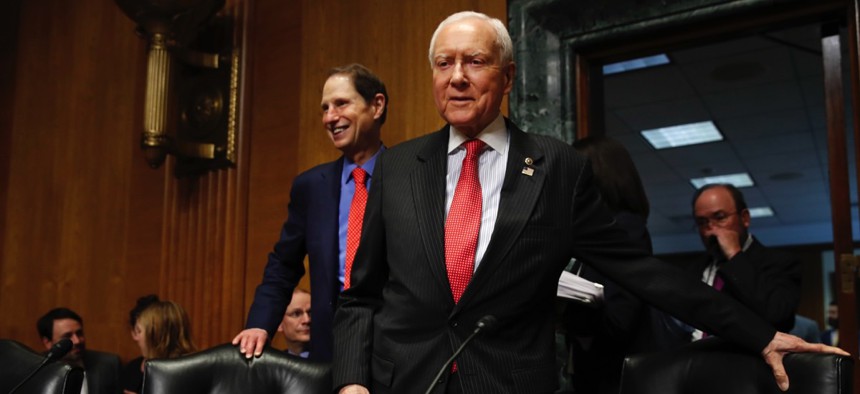Days After Funding Lapsed, Congress Turns to CHIP Reauthorization

Senate Finance Committee Chairman Orrin Hatch and ranking member Ron Wyden. (AP Photo/Jacquelyn Martin)

Connecting state and local government leaders
Plans in both the Senate and the House would scale back federal funding to the program to pre-Affordable Care Act levels, a change that will have serious implications for state budgets.
WASHINGTON — Following a vote in an abbreviated hearing in the U.S. Senate Finance Committee, a bipartisan plan to reauthorize the Children’s Health Insurance Program—which provides nearly 9 million children with coverage—will advance to the floor of the Senate.
That plan, which was co-authored by Sen. Orrin Hatch, a Republican from Utah, who along with the late-Sen. Ted Kennedy helped create CHIP 20 years ago, and Sen. Ron Wyden, an Oregon Democrat, would extend the funding for the program for another five years.
The Hatch-Wyden bill gained momentum in mid-September only to lose steam when Congressional priorities shifted to the latest attempt to repeal and replace the Affordable Care Act. Failure to act before the Sept. 30 reauthorization deadline has sparked budgetary and programmatic uncertainty at the state level.
The Senate bill would extend CHIP’s lifetime until 2022, but would gradually return the program’s federal match rate to its pre-ACA levels over the course of those five years. This feature of the plan is being watched particularly closely by state officials, as it will have serious implications for budget planning. In a state like Minnesota, for example, that change could translate to a $60 million drop in annual federal funding.
State officials are watching the advance of this proposal with a mixture of emotions. Many have expressed disappointment in the reduction in federal funding, but given the circumstances—CHIP funding has already lapsed—these officials are relieved the program is being discussed at all.
This is what Minnesota Commissioner of Human Services Emily Piper had to say about Hatch-Wyden in a conversation with Route Fifty earlier this week:
It wouldn’t be my first choice because it phases out the enhanced ACA match over time. Which, ultimately I think is an unfortunate consequence probably of the politics around the Affordable Care Act right now rather than the importance of continuing to fund CHIP at a rate that best supports the health and wellbeing of the children that receive CHIP. But it certainly is better than what we have now which is no assurance and no guarantee that anything is actually going to come out of Washington, D.C. to reauthorize this really important program.
It's a sentiment echoed by Linda Nablo, the chief deputy director of the Virginia Department of Medical Services.
"I think states would breathe a sigh of relief" if Hatch-Wyden passed, Nablo told Route Fifty before the Sept. 30 deadline.
"It’s not perfect, we’d all like to keep this enhanced match believe me," Nablo added. "But I think we’re so close to the wire and it’s getting so scary that I think states would breathe a big sigh of relief, both because it’s a five year extension and it does at least wind down the enhanced match in a way that wouldn’t hit state budgets that are already set."
The Senate has not yet determined how it plans to pay for its reauthorization plan.
A similar bill is also up for a vote on Wednesday in the House Energy and Commerce committee. Like the Senate bill the measure would extend CHIP funding until 2022 and phase out the increased match rate. The House measure also includes an additional $1 billion over two years to shore up Puerto Rico’s Medicaid program.
But, there will likely be a fight over House's the plan to pay for its bill. As it currently stands, the plan would cut Obamacare’s Prevention and Public Health Fund by $6.4 billion over the next decade and raise Medicare premiums for people who earn more than $500,000. The Energy and Commerce bill would also allow states to disenroll lottery winners from Medicaid and cut the grace period given to ACA enrollees who don’t pay their premiums by one-third—from 90 days to 30 days.
Floor votes could come quickly on both of these measures, after which both houses would need to resolve any legislative differences.
Quinn Libson is a Staff Correspondent for Government Executive’s Route Fifty.

NEXT STORY: Smart city success stories





